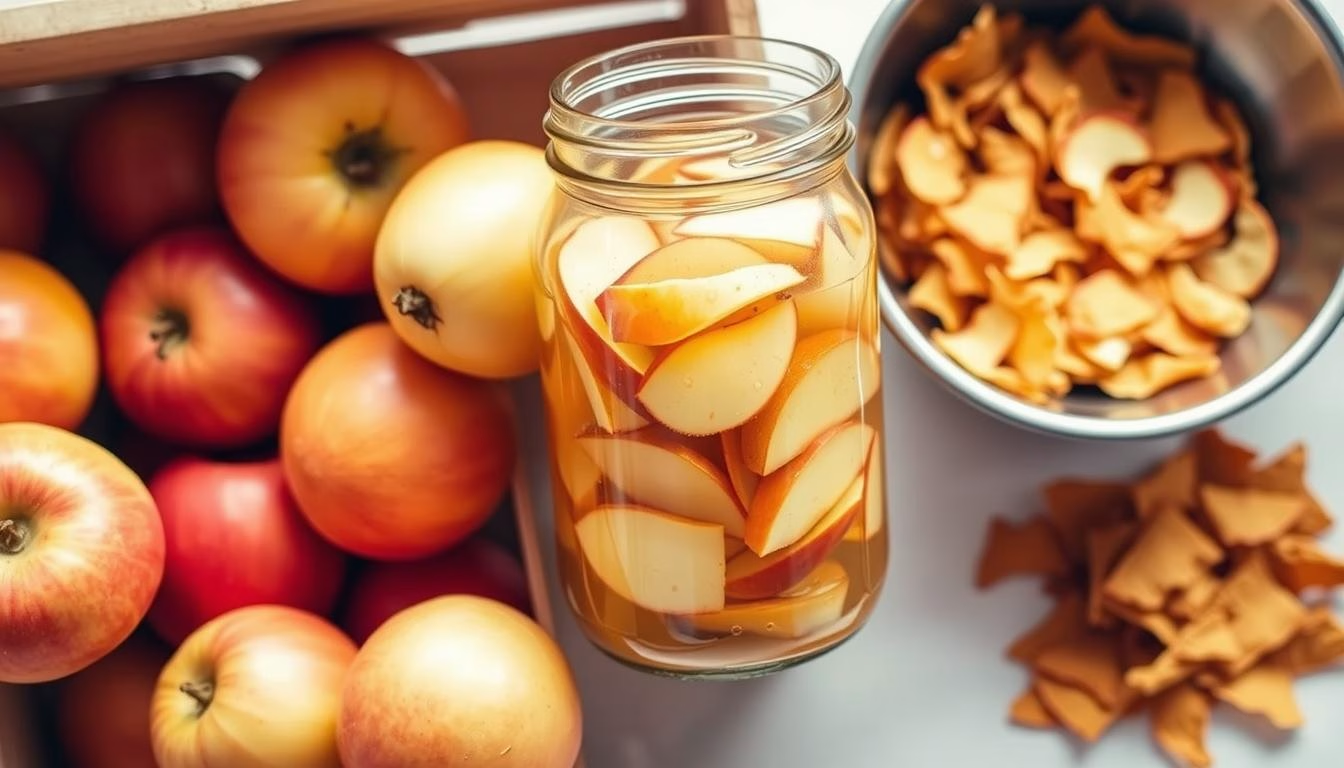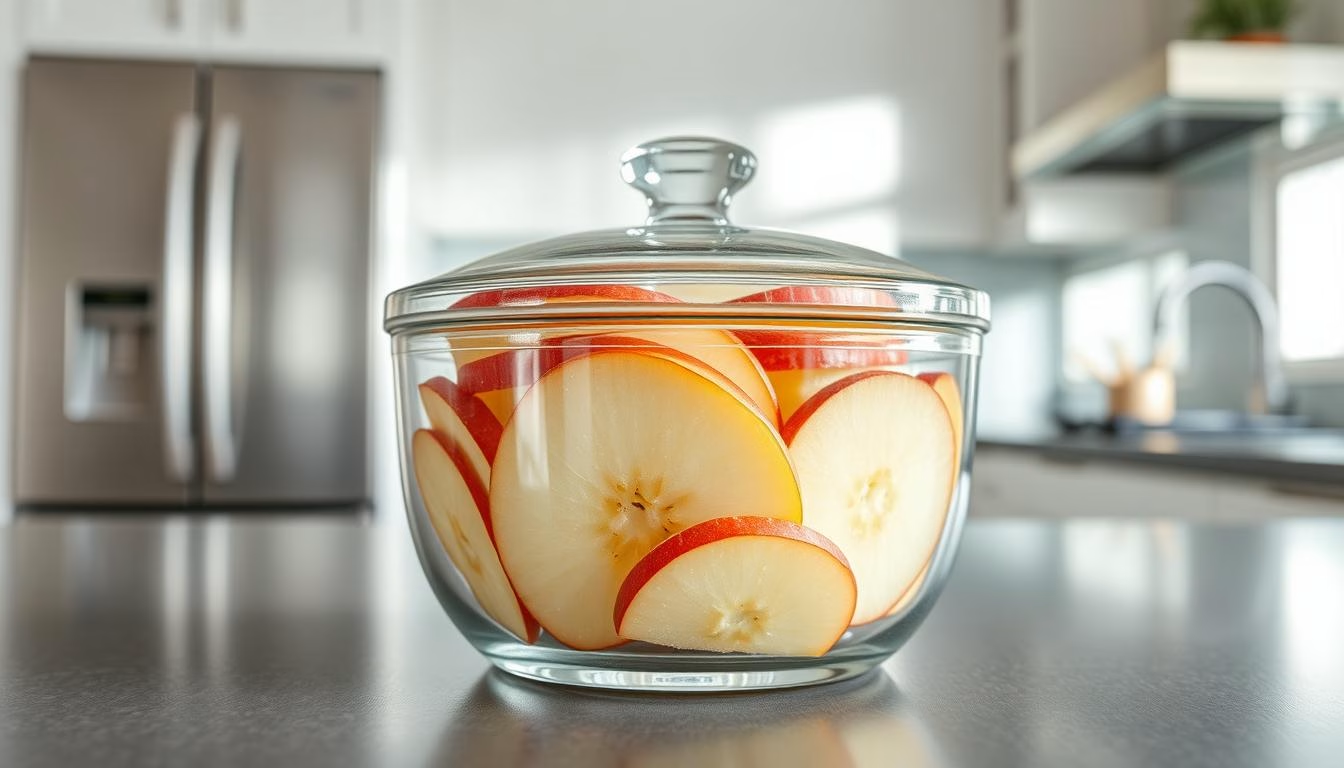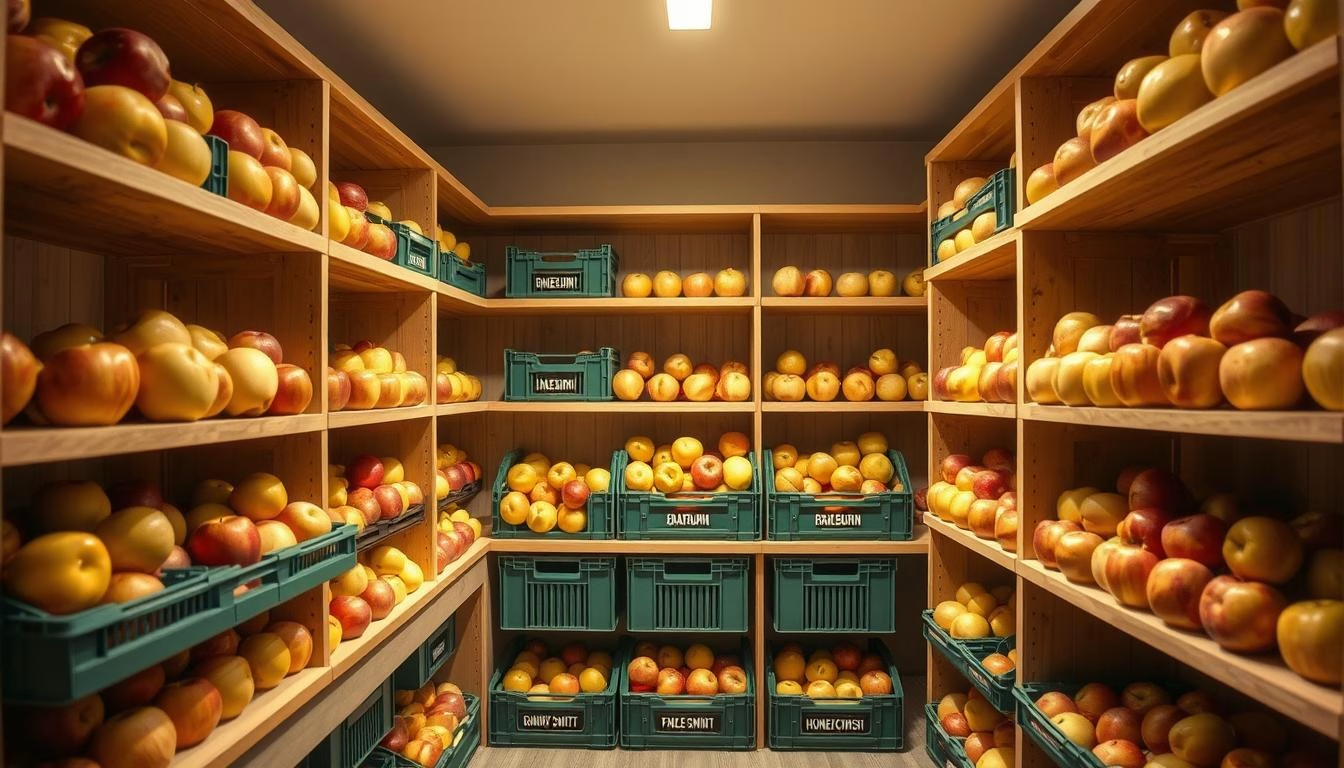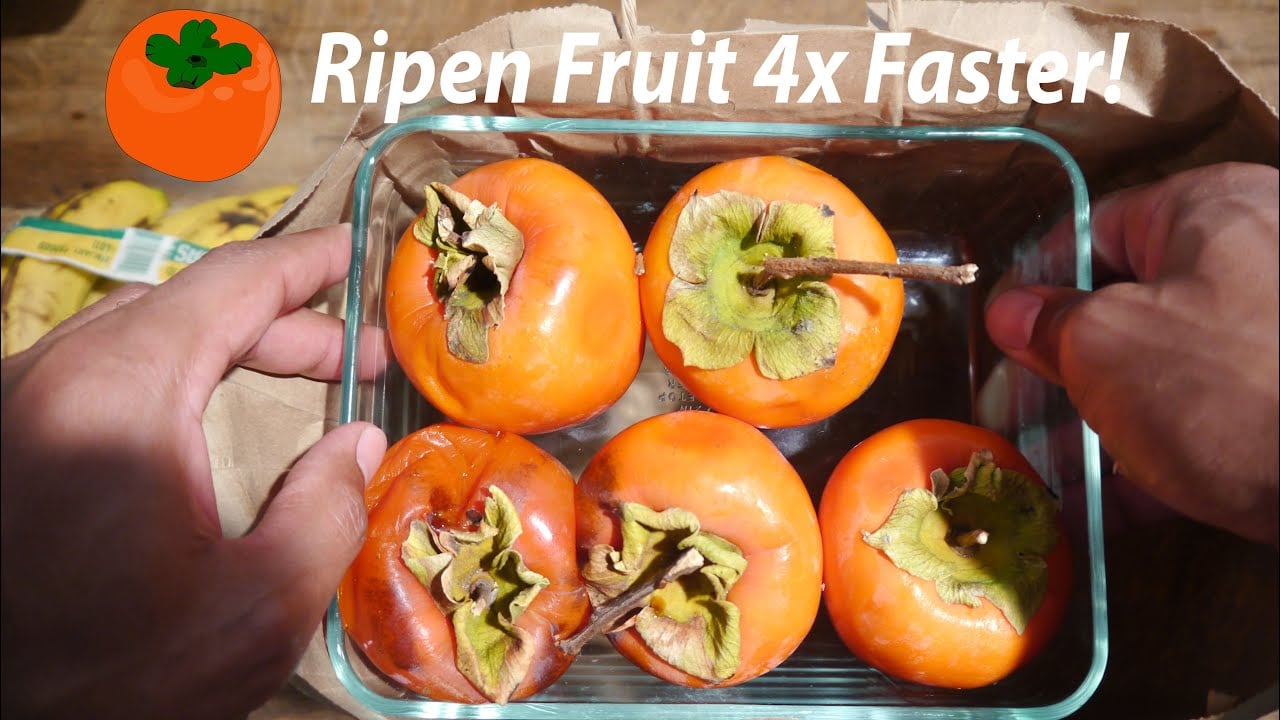Hey, you know how sometimes you buy a big bag of cooking apples, all excited to bake, and then a week later they’re already getting soft and a bit sad? Yeah, it’s the worst. But I’ve figured out the best way to store cooking apples so that actually doesn’t happen to you. It’s not rocket science, just a few simple things that make a massive difference in keeping those apples crisp and perfect for baking. If you want to enjoy delicious apple pies, crisps, and sauces for weeks, even months after bringing your apples home, then you’re in the right place. Let me tell you the secrets to long-lasting apple freshness, so you can bake up apple perfection anytime.
Handling apples with care is crucial. They should be treated as fragile as eggs to avoid bruising, which can lead to increased ethylene production and faster spoilage. The storage method you choose, such as room temperature, refrigerator, or freezer, significantly impacts how long your apples will last. Factors like the storage environment, temperature, humidity, and packaging (using paper or paper bags) play a critical role in maintaining their quality.
This article combines scientific guidance with practical kitchen tips to help you store apples effectively. By following expert recommendations and understanding the science behind apple storage, you can enjoy your apples throughout the year. Stay tuned for detailed insights and tips on how to keep your apples fresh and delicious.
Understanding Apple Storage: Key Factors for Freshness
Properly storing apples involves understanding the science behind their ripening and the specific needs of different varieties. This ensures your apples stay fresh and flavorful for as long as possible.
The Role of Ethylene Gas in Ripening
Apples, like many fruits, produce ethylene gas as they ripen. This natural process can be accelerated by bruising or poor handling, leading to faster spoilage. Experts like Catherine Gipe-Stewart and Ken Wortz note that ethylene not only ripens apples but can also affect nearby produce. To slow this process, store apples in a cool, well-ventilated area, away from other fruits and vegetables.
Keeping apples separate from other produce is crucial. Ethylene gas can cause surrounding fruits and vegetables to ripen more quickly, reducing their shelf life. For optimal storage, place apples in the refrigerator’s crisper drawer, using a breathable bag to maintain humidity while allowing ethylene to escape.
Variety-Specific Storage Considerations
| Apple Variety | Storage Recommendations | Duration |
|---|---|---|
| Red Delicious | Cool, dry place or refrigerator | 2-4 months |
| Cosmic Crisp | Refrigerator at 32-40°F | 6-9 months |
| Honeycrisp | Refrigerator, consumed quickly | 1-2 months |
Long-storing varieties like Red Delicious and Cosmic Crisp can last several months when stored properly. Honeycrisp apples, however, are best enjoyed fresh due to their shorter storage life. For more tips on keeping your desserts fresh, visit this guide.
Mastering the Best Way to Store Cooking Apples
Storing apples effectively requires a thoughtful approach, balancing convenience and preservation. Whether you prefer the freshness of countertop storage or the longevity of refrigeration, understanding the pros and cons of each method is key to maintaining your apples’ quality.
Refrigeration vs. Countertop: Finding Your Ideal Method
Refrigeration offers a controlled environment, typically extending the life of apples for 1 to 2 months. The crisper drawer is ideal, as it maintains humidity and allows ethylene gas to escape, slowing ripening. For shorter storage, the countertop is suitable, keeping apples fresh for about a week when stored in a paper bag.
Proper Handling and Wrapping Techniques
Handle apples gently to avoid bruising and wrap them in paper or place them in a paper bag to protect their skin. For sliced apples, add a splash of lemon juice to prevent browning. Experts suggest storing whole apples separately to avoid cross-ripening effects from ethylene gas.
| Storage Method | Duration | Pros |
|---|---|---|
| Refrigeration | 1-2 months | Longevity, controlled environment |
| Countertop | 1 week | Convenience, freshness |
| Crisper Drawer | Optimal conditions | Maintains humidity, ethylene escape |
Visit this guide for more storage tips. Proper techniques ensure your apples stay fresh and flavorful in your kitchen.

Long-Term Apple Storage Solutions
Creating an environment similar to a root cellar can significantly extend the life of your apples. A root cellar traditionally provides cool, humid, and dark conditions, slowing down the ripening process. While not everyone has access to a root cellar, simulating its conditions at home is achievable.
Simulating a Root Cellar Environment at Home
To replicate a root cellar environment, focus on maintaining low temperatures between 32 to 40°F and high humidity levels of 80 to 95%. Basements or unheated closets often provide the ideal setup. Place apples in paper bags or breathable containers to maintain humidity while allowing ethylene gas to escape.
Store apples in a single layer to prevent spoilage and ensure good air circulation. Check on them regularly to remove any rotten apples, as they can spoil the entire batch. For more tips on maintaining freshness, visit this guide.
With proper handling and storage, apples can remain fresh for several months, allowing you to enjoy them throughout the year.
Innovative Tips for Sliced, Frozen, and Processed Apples
When it comes to preserving apples for various culinary uses, creativity and the right techniques can make all the difference. Whether you’re slicing apples for snacks or freezing them for future baking projects, there are innovative methods to maintain their flavor and texture.
Freezing Apples: Preserving Flavor for Baking
Freezing is an excellent way to keep apples fresh for long periods. For baking, try flash-freezing sliced apples. Simply arrange them in a single layer on a baking sheet and place it in the freezer. Once frozen, transfer the slices to airtight containers or plastic bags for storage. This method preserves their flavor and texture without the need for thawing before use.
Preventing Browning in Fresh Apple Slices
Fresh apple slices can turn brown quickly due to oxidation. To prevent this, toss the slices with a splash of lemon or orange juice. The acidity inhibits browning, keeping them fresh and visually appealing. Store them in airtight containers or paper bags in the refrigerator for up to 24 hours.
Alternate Storage Methods for Different Apple Uses
For pies and sauces, consider storing sliced apples in resealable bags or airtight containers. This maintains their texture and prevents moisture loss. If you prefer a tangy flavor, add a slight tartness with a splash of juice before storing. These methods allow home cooks to repurpose apples for a variety of dishes, from apple butter to cider recipes.

By implementing these innovative techniques, you can enjoy your apples year-round, whether they’re destined for the freezer, fridge, or your next culinary creation.
For the Freshest Cooking Apples, Remember These Best Storage Practices
Properly storing apples is a blend of science and practicality, ensuring they remain fresh and flavorful for as long as possible. By understanding how ethylene gas affects ripening and using techniques like refrigeration or simulating a root cellar, you can enjoy your apples year-round.
Whether you prefer the convenience of countertop storage for a few days or the longevity of refrigeration for several months, the method you choose should align with your needs. Always handle apples gently to avoid bruises and use breathable containers to maintain humidity and allow ethylene gas to escape.
For those looking to experiment, freezing sliced apples is a great way to preserve them for future pies or cider recipes. A splash of lemon juice can prevent browning, keeping your apples fresh and visually appealing.
Thank you for joining us on this journey into the world of apple storage. We hope you’ve gained valuable insights to keep your apples fresh and delicious. Share your own tips and experiences with us—we’d love to hear how you make the most of your apples!
Informed storage choices lead to better quality produce, whether you’re enjoying your apples today or savoring them months from now. Happy storing!
FAQ
How long can I keep apples fresh in the fridge?
Apples can stay fresh in the fridge for up to 6 months if stored properly in a crisper drawer with high humidity and consistent cold temperatures.
Should I store apples in plastic bags or paper bags?
Use a paper bag to allow ethylene gas to escape while maintaining humidity. Plastic bags can trap moisture and ethylene, leading to faster ripening.
Can I store apples at room temperature?
Yes, but only for a short time. Apples stored at room temperature will ripen faster due to higher ethylene gas production. For longer storage, refrigerate them.
How do I prevent apples from browning after slicing?
To prevent browning, sprinkle sliced apples with lemon juice or vinegar. You can also store them in an airtight container in the fridge.
Can I freeze apples for later use in pies?
Yes, freezing is a great way to preserve apples. Peel, core, and slice apples, then freeze them in airtight containers or freezer bags for up to 12 months.
What is the best way to store cut apples to keep them fresh?
Store cut apples in an airtight container in the fridge. Sprinkle with lemon juice to prevent browning and keep them fresh for up to 3 days.
Do all apple varieties store the same way?
No, some varieties like Granny Smith and Fuji are better for long-term storage due to their thicker skins and slower ripening process. Choose the right variety for your storage needs.
Can I store apples in the crisper drawer with other fruits?
Yes, but apples produce ethylene gas, which can ripen other fruits faster. Store them separately if you want to slow ripening of other produce.
How do I know if an apple is still good to eat?
A fresh apple should be firm and have no signs of mold or soft spots. If it’s wrinkled or mushy, it’s past its prime.
Can I store apples in a bowl on the countertop?
Yes, but they’ll ripen faster. For short-term storage (up to a week), a bowl is fine. For longer storage, refrigerate them.
What is the ideal temperature for storing apples?
The ideal storage temperature for apples is just above freezing, around 32°F (0°C), which is typically the temperature of your fridge’s crisper drawer.


